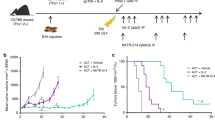Abstract
In our previous studies using gene gun-mediated delivery of interleukin 12 (IL-12) cDNA in vivo, we observed T-cell-mediated regression of established murine tumors and demonstrated the induction of systemic immunity in test animals. In this study, we further characterized the antitumoral and anti-metastatic effect of this gene therapy approach by employing two murine metastatic mammary tumor models: the immunogenic TS/A adenocarcinoma and the weakly immunogenic 4T1 adenocarcinoma. In the TS/A model, gene transfer into the skin overlying an established intradermal tumor with an IL-12 cDNA expression vector resulted in complete tumor regression in 50% of mice followed by the development of immunological memory. In contrast, the growth of the intradermal 4T1 tumors was not affected by the IL-12 gene therapy protocol. However, this treatment resulted in a substantial reduction of spontaneous metastases in the lungs of 4T1 tumor-bearing mice and significantly prolonged their survival time. T cells were not required for this anti-metastatic effect, because it was also observed in nude mice and in mice depleted of CD4+ and CD8+ T cells. Tumor-draining lymph node cells obtained from 4T1 tumor-bearing mice treated with IL-12 cDNA exhibited increased natural killer (NK) activity and produced enhanced levels of interferon-γ (IFN-γ) compared with similar mice treated with luciferase cDNA. In addition, in vivo depletion of NK cells or neutralization of IFN-γ resulted in partial suppression of the anti-metastatic effect of IL-12 gene therapy, suggesting the involvement of both NK cells and IFN-γ in this effect.
This is a preview of subscription content, access via your institution
Access options
Subscribe to this journal
Receive 12 print issues and online access
$259.00 per year
only $21.58 per issue
Buy this article
- Purchase on Springer Link
- Instant access to full article PDF
Prices may be subject to local taxes which are calculated during checkout
Similar content being viewed by others
Author information
Authors and Affiliations
Corresponding author
Rights and permissions
About this article
Cite this article
Rakhmilevich, A., Janssen, K., Hao, Z. et al. Interleukin-12 gene therapy of a weakly immunogenic mouse mammary carcinoma results in reduction of spontaneous lung metastases via a T-cell-independent mechanism. Cancer Gene Ther 7, 826–838 (2000). https://doi.org/10.1038/sj.cgt.7700176
Received:
Accepted:
Published:
Issue Date:
DOI: https://doi.org/10.1038/sj.cgt.7700176
Keywords
This article is cited by
-
Engineering Tumor Cells with Tumor Necrosis Factor α (TNF-α) or CD40 Ligand (CD40L) Genes Induce Anti-tumor Immune Responses
International Journal of Peptide Research and Therapeutics (2019)
-
Antitumor effect of antibiotic resistance gene-free plasmids encoding interleukin-12 in canine melanoma model
Cancer Gene Therapy (2018)
-
New insights into IL-12-mediated tumor suppression
Cell Death & Differentiation (2015)
-
CCL5 as a potential immunotherapeutic target in triple-negative breast cancer
Cellular & Molecular Immunology (2013)
-
Susceptibility of breast cancer cells to an oncolytic matrix (M) protein mutant of vesicular stomatitis virus
Cancer Gene Therapy (2010)



